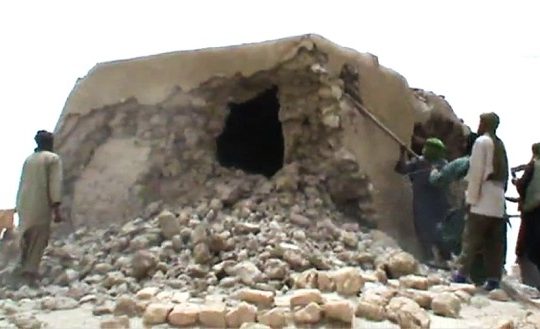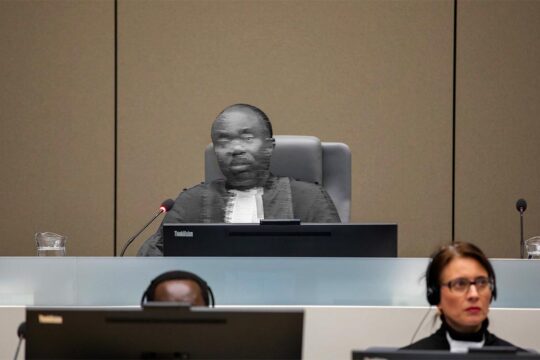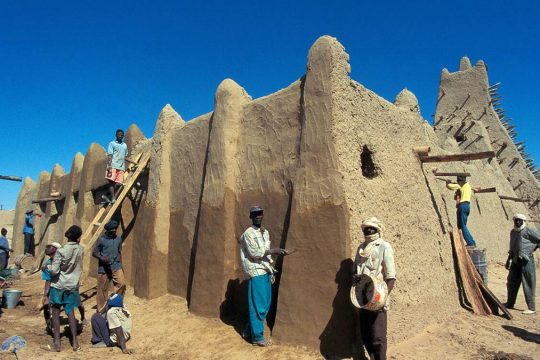Prosecutors Tuesday will unveil charges against an alleged Al-Qaeda-linked Islamist accused of destroying monuments at the fabled city of Timbuktu in an unprecedented case before the world's only permanent war crimes court.
Ahmad al-Faqi al-Mahdi will be the first jihadist to appear before the International Criminal Court (ICC), and the first person in its dock facing war crimes charges for allegedly ordering an attack on a historic monument.
Prosecutors will be seeking to convince three judges they have enough evidence to try Faqi, who is about 40, in what will also be the first case brought by the ICC over the extremist violence that rocked the western African nation of Mali from 2012 to 2013.
The two-day hearing at the court in The Hague has been called to confirm the charges against Faqi, before the start of an eventual trial at a later date.
Straddling the southern gateway of the Sahara desert and a protected world heritage site, the mere mention of Timbuktu, which was once a key trading post, evokes centuries of history.
So there was global outcry when jihadists overran it in early 2012, and attacked its ancient earthen mausoleums dating back to the city's golden age as an economic, intellectual and spiritual centre in the 15th and 16th centuries.
According to the ICC arrest warrant, Faqi is accused of being "responsible individually and jointly with others ... for committing war crimes by deliberately attacking" religious and historic monuments between June 30, 2012 and July 10, 2012.
- Centre of civilisation -
"I think this is an extremely powerful case," Stephen Rapp, former US ambassador-at-large for war crimes, told AFP.
"In these sort of conflicts, the destruction of religious, cultural or historical objects, and the patrimony of the people, is another way in which you destroy a civilisation, destroy a religion, the kind of things on which life is based in our societies."
Timbuktu, founded in the 11th century, was "one of the great centres of Islamic learning in the world, a centre of civilisation at a time when Europe was in the dark ages," said Rapp, now a distinguished fellow with The Hague Institute for Global Justice.
But some rights group fear scores of victims from the violence that beset northern Mali will not see justice done, urging that charges be widened against Faqi to include rape, sexual slavery and forced marriage.
Carrie Comer, permanent representative to the ICC for the International Federation for Human Rights (FIDH), said it was a "fascinating case."
"We definitely believe that the destruction of cultural property and heritage is indeed a war crime," she told AFP.
"However, it is a bit of challenge for those of us who work with victims in Mali because the destruction of cultural property is not the only thing that this man has been accused of."
She highlighted "credible allegations" made against Faqi and 14 others in Malian courts accusing them of war crimes including sexual atrocities.
"It is difficult to reconcile that this person who has criminal complaints against him in Mali for much broader charges is only being charged with destruction of cultural property."
A leader of the Ansar Dine extremist group, Faqi was unexpectedly handed over to the tribunal in The Hague in September by Mali's neighbour Niger.
- Idolatrous -
Ansar Dine, a mainly Tuareg group, held sway over Mali's desert north together with Al-Qaeda in the Islamic Maghreb (AQIM) and a third local group, until being routed in a French-led intervention in January 2013. Much of the northern stretches however remain out of the government's control.
A member of an Islamic court set up by the jihadists to enforce strict sharia law, Faqi is alleged to have jointly ordered or carried out the destruction of nine mausoleums and Timbuktu's famous Sidi Yahia mosque.
The jihadists considered Timbuktu, a UNESCO world heritage site since 1988 and dubbed the "city of 333 saints," as idolatrous.
UNESCO has now restored the 14 destroyed earthen shrines at the city about 1,000 kilometres (600 miles) northeast of Mali's capital Bamako.
But as the world witnesses the destruction of other cultural treasures by the Islamic State group in Syria and Iraq the case could act as a powerful warning and help persuade nations to pursue such charges, added Rapp.






